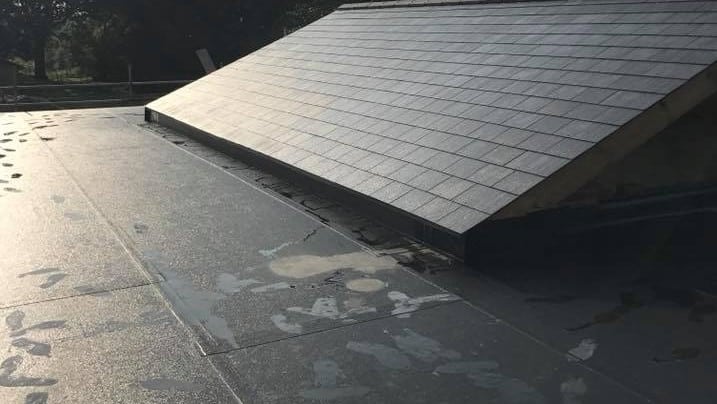Singleply roofing is formed from extremely strong membranes made up of an of synthetic polymer meaning they benefit from being robust and dexterous.
How thick the singleply is ranges from just over a mil to just over 2mil. There are different variants of Singleply roofing with some being made of glass fibre which is reinforced, others polyester, others are homogenous – these differences all relate to the project and reason for use. Singleply, when processed, creates a waterproofed surface which is then brought together with insulation and continuous support which in many tradesman’s opinions makes Singleply roofing the all-rounder of roof options. Singleply roofing is something that Maiva have a wealth of experience installing and maintaining.
Singleply roofing
Do you have any questions?
Contact us at Maiva Rooing today to book a free, no obligation roofing consultation.
Contact Us
Singleply roofing
There are multiple types of singleply roofing membranes. Here is a brief summary of the options available:
- PVC Single Ply: Polyvinyl Chloride Single Ply: PCV single ply is very well known. They aren’t compatible with bitumen unless there’s a separating layer, PVC can be welded either by heat or solvent.
- CPE Single Ply: Chlorinated Polyethylene Single Ply: Is flexible, welded by either heat or solvent and generally bitumen compatible.
- EPDM Singleply roofing: Ethylene Propylene Diene Terpolymer Singleply for its full name: It’s a flexible material which gets carbon black introduced to it for increased rigidity and overall stability. Compatible with bitumen, EPDM single ply normally has joined with a tape bonding primer and can also utilise adhesives for joining.
- PIB Single ply roofing: Polyisobutylene single ply: Like EPDM this option also includes carbon black to give it sturdiness. PIB Single Ply is also compatible with bitumen and is solvent welded using tape systems.
- TPE Single ply roofing: Thermoplastic Polyolefin Elastomer single ply: TPE doesn’t absorb liquid or moistures, enjoys a wide temperature scale meaning it can go from hot to cold and do well in a variety of climates. When welded TPE single ply doesn’t produce any smoke or poisonous gases.
- VET Singleply roofing: Vinyl ethylene terpolymer single ply: Is a blend of PCV an EVA which stands for Ethylene Vinyle Acetate, it’s bitumen friendly and is flexible in how it’s welded either by solvent or heat. VET single ply is an all round flexible blend.
- FPO Single ply roofing: Flexible Polyolefin single ply: Is heat-weldable polyolefin-based upon polyethene which may need prep of the lap before it’s welded. FPO singleply is fine with bitumen and is good for the environment as their membranes can be recycled for future use.
Potential issues with singleply:
Seam failure is a potential issue with single ply. As single-ply membranes can be prone to reduce in size, losing their flexibility too. This for single ply isn’t good as it builds stress at the seams which can cause seam failure in single ply.
Attachment failure is another issue that can happen with single ply as it’s caused by wind uplift if it’s severe meaning it fails to attach the singleply.
Singleply issues with Blisters that are the loss of join in the membrane more often than not caused by trapped moisture in the single ply roof.
Shrinkage is another potential watch out for single ply roofs. Occuring when the membrane loses elasticity, it shrinks and tears the flashings.
